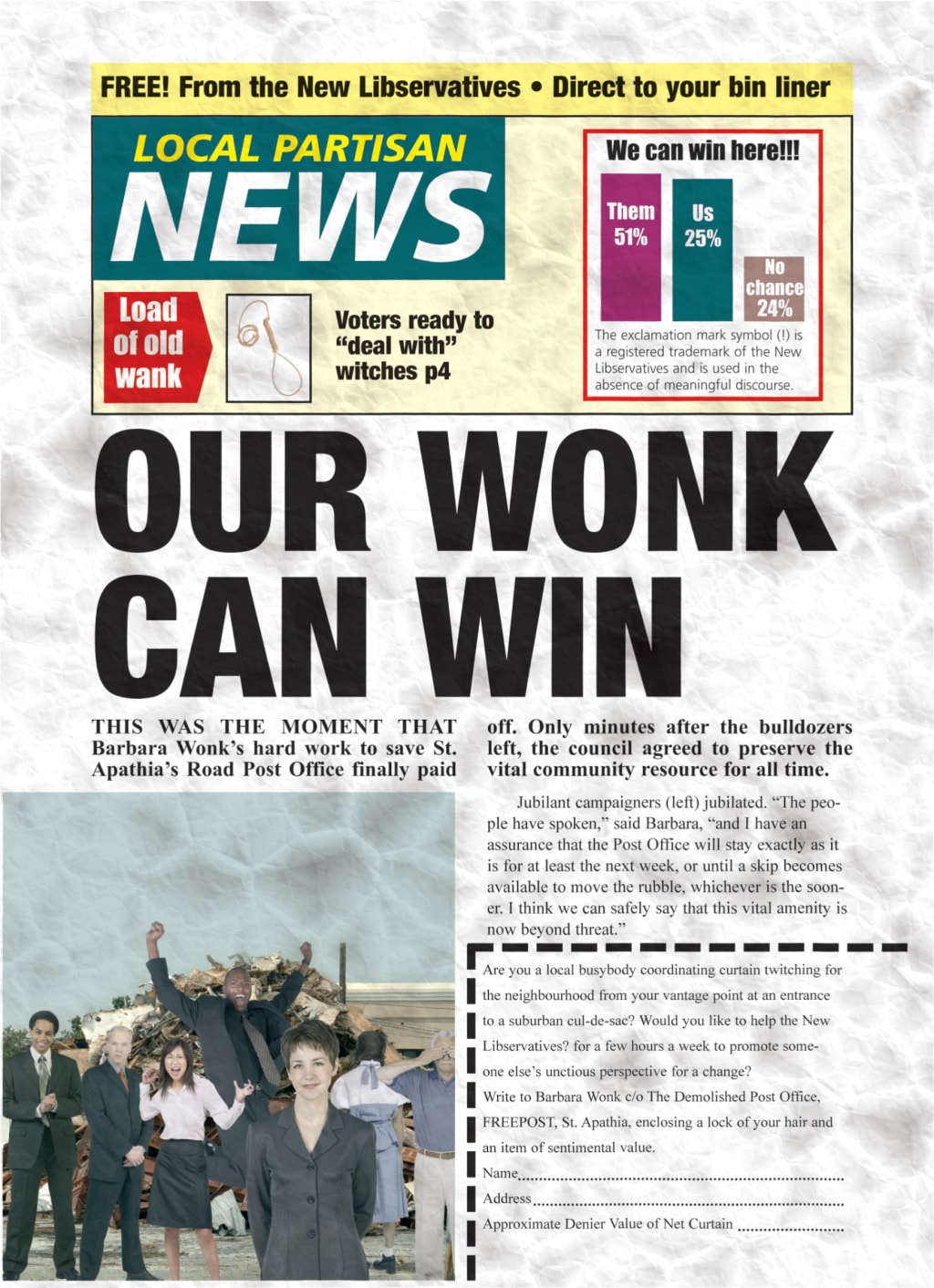
Every five years (four years, if sooner) Britons vote for a candidate to represent them as a Member of Parliament in a General Election.
The largest party forms a government, while the runners-up declare that it’s not the winning that’s important, but the taking part and, as a direct consequence, fire their leader for taking part. It’s just like the hit parade.
With this in mind, it’s important that everybody votes, so we have compiled this handy guide for the first-time voter. So, put down your pop discs and Melody Maker and let’s go!
How to Vote
First, you must find your Polling Station to vote (in Scotland it is called a Polling Place in order to be pointlessly distinctive, in Wales it is known by a name that sounds like somebody vomiting up an owl pellet). Unless you live in one of the more advanced constituencies, there is not usually a bar provided.
Once you are inside, and have shown your poll card or given your name to an official, identifiable by the aura of a person who hangs around magistrates courts as a hobby, you will be given a ballot paper and may vote in one of the cubicles provided. You must bring Photo ID. Acceptable Photo ID includes any of the following:
- Conservative Party Membership Card.
Select a cubicle with care
- Selection of a cubicle follows the same etiquette as the gentleman’s urinal code, and you should always vote in a booth not adjacent to one already in use.
- Likewise, it is not always necessary to wash your hands unless your aim is poor or you make a mark down the side.
- You must make a cross composed of two strokes against the candidate you wish to vote for.
- Do not tick, draw a smiley face, spray your tag or staple your latest flier to the ballot. You really don’t want any of the parties at your party.
About Democracy
Democracy is often personified as a somewhat retarded old gentleman neglected by his busy, monomaniacal children and left to rot under a canal bridge drinking turps and shouting “I used to be important you know, I used to be somebody”, but that’s not the whole story — and any resemblance to the circumstances of Harry Bladder, father of the Minister of Truth and Other Information, Alan Bladder, MP, is purely circumstantial.

These days, democracy is a much more dynamic process, and the way that process functions is a very long way indeed from that stupid old man.
A Day in the Life of Democracy
- 0915 Focus group
All new policies are discussed by a focus group of senior directors of multinationals — also known as the Cabinet. This session of informal bribery is followed by an adjournment in the Government Liquor Cupboard.
- 0925 Cabinet meeting
Results from the focus group are reviewed. Members of the Cabinet who expressed weakness or reservations are prevented from returning from the Liquor Cupboard. The policy is passed. Everything else is pissed.

- 1000 Transparency review
The decision is passed to the Cabinet’s Transparency Review Section, which meets in a locked basement reached through a doorway leading from a secret platform in an abandoned Tube station 300ft below an MOD base on a super-node of a secret Wiltshire leyline. Its purpose is to subject the policy to transparency tests. A version of the policy is printed on cling film in order to detect any opaqueness. A successful test of transparency is, therefore, one where nothing is seen.
- 1100 Tendering process
Once the decision has been determined by the Senior Determinator, a rigorous tendering process begins, integrating the various criteria of value-for-money, standards conformity, best practise guidelines, legal safeguards, cost-benefit analysis and the colour of the regulator’s logo.
- 1110 Tender awarded
In a dark corner of a major London railway terminus.
- 1120 Payment of contractor
Civil servants are dispatched with holdalls full of cash, using directions written on edible rice paper to the location of a dead letterbox agreed with the contractor in advance.
- 1135 Contractor goes bankrupt
A carefully researched corner of the Insolvency Act not only allows directors to start another business within 15 minutes, but also to receive OBEs for services to British embezzlement.
- 1210 Cloning of civil servants
The new policy generates a huge work load. Civil servants become unable to keep up with the demands of office life which are, broadly speaking, Internet surfing and distributing jokes by email that meekly reinforce sexual stereotyping in a non-confrontational manner. To keep up with their sacrosanct duties, the extension of sheep-cloning experiments to bureaucrats is authorized by government. A breakthrough is announced at 1217.
- 1300 Consultants arrive
The government brings in consultants to manage the process of bureaucrat cloning that will enable the policy to be implemented. A new IT system experiences “teething troubles” when it creates a race of super powerful mailroom androids that start to “delete” people instead of posting them consultation documents.
- 1415 Injunction
The policy is challenged in court by a consortium of Bolshevics who claim that the government is out of touch with ordinary people. Compelling evidence is offered of the Prime Minister wearing ‘slacks’ in a disco and the judge rules against it.
- 1540 Listening
The government listens and the policy is saved by a procedural branding arrangement. It is called something else. The families of the deleted demand a public enquiry.
- 1600 Government enquiry
A powerful government enquiry is launched by the Cabinet into the workings of the Cabinet. The Cabinet is hauled before the Cabinet.
- 1630 Conclusion
A number of officials are reprimanded, presentation issues are discussed and the electorate is found wanting.
Behind the Scenes
The decision-making process is a highly complex one, and couldn’t be achieved without the mindless dedication of the following unsung Cabinet Heroes.

- Name: Carmen Spann-King
- Position: Under Secretary of State
- Duties: Submits to dominant parliamentary committees on constitutional affairs, but is most frequently tied up in controversial briefs on strict regulatory frameworks.

- Name: Sir Iain McGolly-Gosh
- Position: Vice-assistant to the Deputy Permanent Private Under-Secretary.
- Duties: Adjusting tie, agreeing with everything so nobody catches on that he delegates the very few duties he has to the Cabinet toilet cleaner, the Deputy Assistant Vice-secretary of State for Porcelain Management.

- Name: Lord Aubrey Bombed
- Position: Parliamentary Party Head
- Duties: Deals with procurement of supplies for party functions. This man is not actually a member of the Cabinet Office, but is great fun to be around, whoever he is.
About the Creator
Ian Vince
Erstwhile non-fiction author, ghost & freelance writer for others, finally submitting work that floats my own boat, does my own thing. I'll deal with it if you can.






Comments
There are no comments for this story
Be the first to respond and start the conversation.